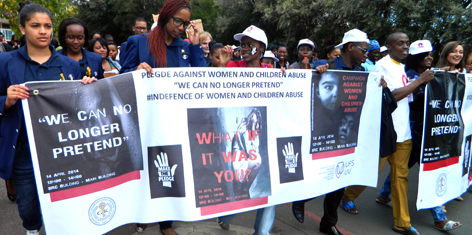
The SRC took the lead on Monday by orchestrating a campaign to create awareness and instill consciousness on campuses to act against the abuse of women and children.
During a march from the Thakaneng Bridge to the Main Building on the Bloemfontein Campus, the SRC led students in a Pledge Against Women and Children Abuse to ensure that the UFS community become accountable. The message proclaimed, was one of zero tolerance for the abuse of women and children.
The Dean of Student Affairs, Rudi Buys, addressed students, saying: “No more. This cannot be just another march, but something to speak directly to injustice.”
This campaign was aimed at ensuring that relevant information and services are provided to help women and children. Representatives of Health and Wellness, psychologists and social workers, as well as representatives from the Centre of Trauma Forgiveness and Reconciliation, the Centre for Safety and Security and the Institute of Race and Reconciliation were present during this campaign.
The Vice-Rector: External Relations, Dr Choice Makheta, stressed the point of women and children’s wellbeing, by saying: “As a university we must make sure women are treated well… that children are treated very well.”
Violence against women and children in South Africa happens regardless of age, class or colour. Studies shows 50% of women have been reported experiencing violence at the hands of their intimate partners. Local studies also show that 28% of men have admitted to being rapists. Every hour a child is abused in South Africa.
But Kovsies say “No more! No more!”